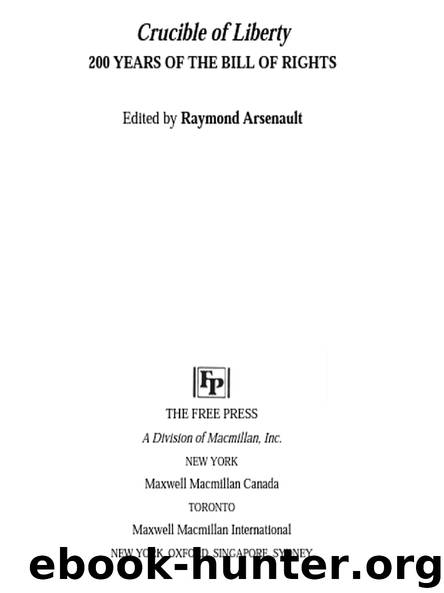Crucible of Liberty by Raymond Arsenault

Author:Raymond Arsenault
Language: eng
Format: epub
Published: 1991-07-15T00:00:00+00:00
8 “A Republic,
If You Can Keep It” Liberty and Public Life
in the Age of Glasnost
JAMES W. CAREY
There is a story from the Constitutional Convention, probably apocryphal, that sets the overall theme of this essay. Benjamin Franklin, then 84, was the oldest delegate to the convention. A citizen of Philadelphia and a well-known public figure, Franklin each day at the conclusion of deliberations was asked by those gathered outside Independence Hall: “Mr. Franklin, do we have a government and if so what kind is it?” And each day Franklin answered, “We have no government as yet.” On the ultimate day as he exited the convention and was asked the predictable question, he answered, or so the story goes: “We have a government; a republic, if you can keep it.” If you can keep it!
Franklin’s remark reminds us that republican forms of government were and still are odd and aberrant occurrences in history. The natural state of humankind is domination; submission is the natural, our natural condition. Political communities founded on civic ties rather than blood relations or bureaucratic rule are rare creatures of history; they have a definite beginning, a point of origin in historical time, and, therefore, they presumably have an end. The suspicion that public liberty is aberrant in nature, that dominion is our natural existence, was one obstacle Franklin and the Founding Fathers had to overcome. Their reading of history convinced them that the last republic vanished some 1800 years earlier, when Caesar crossed the Rubicon in defiance of an edict of the Roman Senate. The founders, then, were acting against history and against nature in willing a republic into existence. Constitution-writing was an attempt to lay a foundation, to create, in the words of Bruce Smith, whose analysis I am closely following, a public space in which the two critical republican roles, citizen and patriot, might exist. Citizenship is a term of space; one is a citizen in relationship to one’s contemporaries with whom one occupies the same space. Patriot is a term of time, a relationship to one’s patrimony and posterity. A patriot is a lover of place; not my country right or wrong, but a lover of what happened in this particular place and might happen yet again.
The foundation of a political society, a republic, unites it in space and time. The art of political creation is to lay a foundation that will make citizens into patriots and patriots into citizens. Only when that is achieved will it be possible to prevent republican government from lurching back into domination; only then will it be possible to deliver republican government, public life, against all the vicissitudes of history, down unchangeable to posterity.
The typical way in which the Constitution and the Bill of Rights is discussed these days is as a legal document: the province of lawyers, a nest of juridically derived meanings, an instrument to adjust and avoid disputes, to advance and promote interests, to protect and enhance rights. In fact, for most people these days, the sole meaning of the First Amendment is that it means “rights.
Download
This site does not store any files on its server. We only index and link to content provided by other sites. Please contact the content providers to delete copyright contents if any and email us, we'll remove relevant links or contents immediately.
| Africa | Americas |
| Arctic & Antarctica | Asia |
| Australia & Oceania | Europe |
| Middle East | Russia |
| United States | World |
| Ancient Civilizations | Military |
| Historical Study & Educational Resources |
Cat's cradle by Kurt Vonnegut(15362)
Pimp by Iceberg Slim(14515)
4 3 2 1: A Novel by Paul Auster(12396)
Underground: A Human History of the Worlds Beneath Our Feet by Will Hunt(12100)
The Radium Girls by Kate Moore(12033)
Wiseguy by Nicholas Pileggi(5791)
The Fire Next Time by James Baldwin(5451)
Perfect Rhythm by Jae(5408)
American History Stories, Volume III (Yesterday's Classics) by Pratt Mara L(5309)
Paper Towns by Green John(5194)
Pale Blue Dot by Carl Sagan(5012)
A Higher Loyalty: Truth, Lies, and Leadership by James Comey(4965)
The Mayflower and the Pilgrims' New World by Nathaniel Philbrick(4506)
The Doomsday Machine by Daniel Ellsberg(4492)
Killers of the Flower Moon: The Osage Murders and the Birth of the FBI by David Grann(4449)
The Sympathizer by Viet Thanh Nguyen(4396)
Too Much and Not the Mood by Durga Chew-Bose(4349)
The Borden Murders by Sarah Miller(4328)
Sticky Fingers by Joe Hagan(4204)
